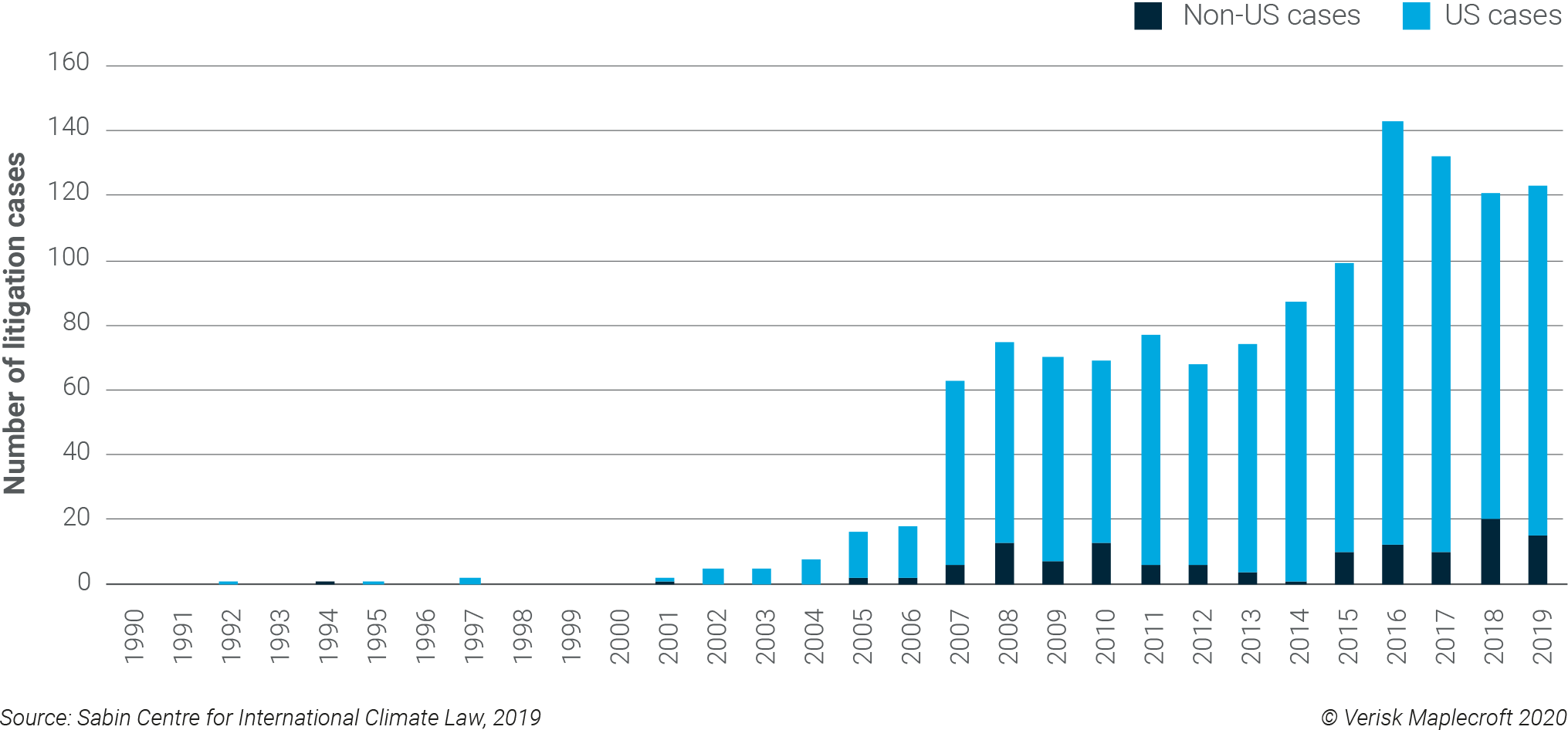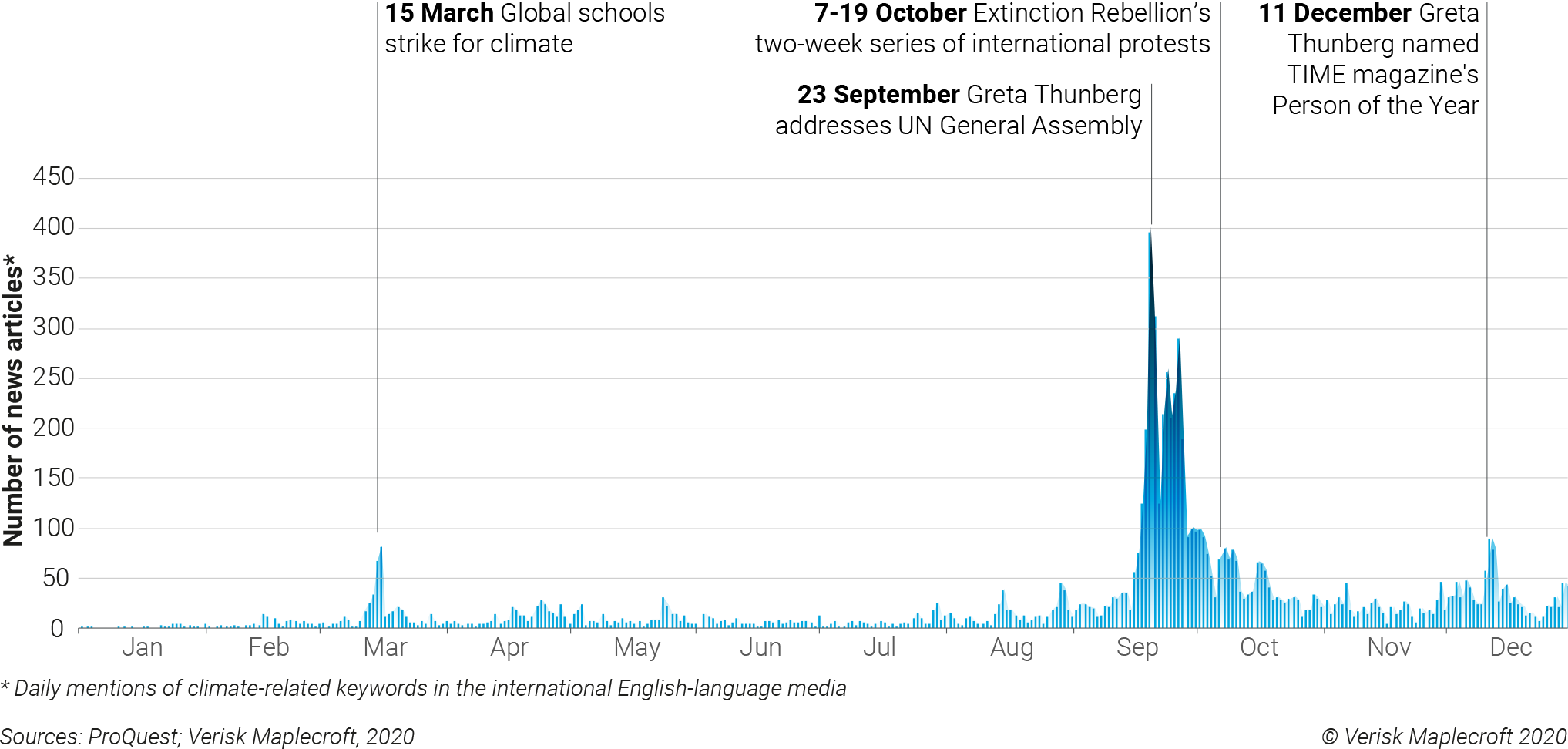Why it matters
Energy companies could be in for a rough ride over the next year. In catapulting the climate emergency onto the front page, climate activists have dragged fossil fuel firms and their investors into the dock as well as into the public consciousness. Driven by prominent campaigners, such as Greta Thunberg, and direct action by groups including Extinction Rebellion, the energy sector is under the spotlight more than at any other time - and this is only set to grow.
In the coming year, climate campaigners will look to build on the momentum gained from global protests and high-profile legal cases with more set-piece actions. Media attention on global warming will also ramp up in anticipation of COP26 in Glasgow in November 2020 and in reaction to the ever-increasing litany of environmental disasters linked to climate change.
Download our Environmental Risk Outlook webinar recording
Activist accusations that oil and gas companies, mining firms, financiers and complicit governments are jeopardising the world’s future is capturing imaginations and, for many people, legitimises targeted action against those perceived to be dragging their feet. With more protests on the cards, the risk of disruption to business activities will likely increase in 2020 which, in turn, will drive more negative publicity in the international media for an industry that is already under pressure from environmentally conscious investors.
Watch out for
The last decade has seen a significant growth in the number of climate-related litigation cases. In December 2019, the Philippines’ Commission on Human Rights ruled that carbon majors could be held legally responsible for human rights violations arising from climate change. The case is the first of its kind and could have wider implications both in the Philippines and beyond, posing risks of shareholder action, legal costs, and reputational damage.
The vast majority of litigation cases are filed in the United States (see Figure 1), reflecting that country’s litigation culture. But they are also becoming more common in the United Kingdom, Australia and the European Union. Such cases are unlikely to result in financial sanctions, but they can attract public attention and, as a result, create negative publicity for those involved.
The rise in activism has shot the issue of climate change to the top of the mainstream media agenda around the world. Content analysis of international news media reveals that mentions of climate-related keywords peaked in late September 2019 following Swedish activist Greta Thunberg’s address to the UN General Assembly (see Figure 2). Coverage remained high throughout the final quarter of 2019, and media interest looks set to continue into 2020.
In September 2019, Greta Thunberg and 15 other children from around the globe submitted a petition to the UN Committee on the Rights of the Child. In it, they allege that five high-emitting countries are violating the Convention on the Rights of the Child, which protects children’s rights to life, health and culture, by their failure to tackle the climate crisis; the countries in question – Argentina, Brazil, France, Germany and Turkey – are all signatories to the treaty.
The petition has yet to clear several legal hurdles but could conceivably be heard by the Committee later this year. Given Thunberg’s high profile, the petition’s fate will generate significant media interest, whether or not it succeeds. Even though the children’s complaint targets five national governments, the action will build pressure on, and scrutiny of, international companies via shareholders, governments, and the general public. The children’s innovative approach could also encourage others to file similar petitions.
While many activists pursue action on climate change by the formal legal route, others use grassroots public protests - with a focus on disruption and civil disobedience. With its uncompromising, hard-line list of demands and colourful, non-violent direct actions, the Extinction Rebellion group has become the principal voice of grassroots climate campaigners.
In the past year, Extinction Rebellion has targeted companies and organisations as diverse as Shell, BlackRock, Barclays, the Bank of England, the Liberal Democrats, Greenpeace and the BBC for their perceived lack of action on climate change. Given the broad range of targets, most major businesses could conceivably be the focus for direct action, particularly those perceived to be ‘greenwashing’ their environmental credentials. A series of climate-related natural disasters at the tail end of 2019, including the Australian bush fires, has amplified public discord over international inaction on climate change.
Next steps
Protests and litigation actions are largely symbolic but are intended to raise pressure on companies and governments to be seen to be acting on climate change. Given that many organisations previously seen as strong performers in the climate sphere have been targeted, businesses can adopt robust internal climate change mitigation strategies and rigorous climate disclosures to avoiding legal action and public ‘shaming’ by activist groups.
Investors may consider divestment from higher risk carbon-intensive holdings and boost investment in greens bonds, blue bonds and renewables in order to soften portfolios. More rigorous initiatives such as Science Based Targets are available for companies wishing to avoid accusations of greenwashing.

